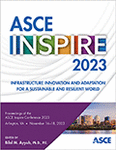A Data-Driven Approach to Evaluate the Compressive Strength of Recycled Aggregate Concrete
Publication: ASCE Inspire 2023
ABSTRACT
This paper examines the application of machine learning (ML) techniques in the prediction of the compressive strength of recycled aggregate concrete (RAC). The ML models are trained on a comprehensive dataset composed of 981 different RAC test results. Four algorithms of multiple linear regression, lasso regression, random forest, and histogram-based gradient boosting are investigated. The ML training workflow consists of careful feature selection and rigorous hyperparameter tuning based on cross-validation on the training set. The prediction accuracy of ML models was measured by calculating R-squared and root mean squared error metrics. Lastly, sensitivity analysis was performed to measure the impact of input features on the RAC compressive strength. The results indicate that histogram-based gradient boosting model results in the highest accuracy among the studied ML algorithms where water to cement ratio and cement content were found to be the most influential parameters.
Get full access to this article
View all available purchase options and get full access to this chapter.
REFERENCES
Al Sarfin, M. A., Banerji, S., Esteghamati, M. Z., and Sorensen, A. (2023, June). Prediction of Compressive Strength of UHPC Mix Designs Based on Mix Components Using Machine Learning Techniques. In International Interactive Symposium on Ultra-High Performance Concrete (Vol. 3, No. 1). Iowa State University Digital Press.
Banerji, S. (2022). Using Artificial Intelligence to Derive Temperature Dependent Mechanical Properties of Ultra-High Performance Concrete. In Leveraging Artificial Intelligence in Engineering, Management, and Safety of Infrastructure (pp. 403–422). CRC Press.
De Juan, M. S., and Gutiérrez, P. A. (2009). Study on the influence of attached mortar content on the properties of recycled concrete aggregate. Construction and building materials, 23(2), 872–877.
Deng, F., He, Y., Zhou, S., Yu, Y., Cheng, H., and Wu, X. (2018). Compressive strength prediction of recycled concrete based on deep learning. Construction and Building Materials, 175, 562–569.
EPA. (2022, December 3). Construction and Demolition Debris: Material-Specific Data. EPA. https://www.epa.gov/facts-and-figures-about-materials-waste-and-recycling/construction-and-demolition-debris-material.
Esteghamati, M. Z., and Flint, M. M. (2023). Do all roads lead to Rome? A comparison of knowledge-based, data-driven, and physics-based surrogate models for performance-based early design. Engineering Structures, 286, 116098.
Han, T., Siddique, A., Khayat, K., Huang, J., and Kumar, A. (2020). An ensemble machine learning approach for prediction and optimization of modulus of elasticity of recycled aggregate concrete. Construction and Building Materials, 244, 118271.
Jayasuriya, A., Shibata, E. S., Chen, T., and Adams, M. P. (2021). Development and statistical database analysis of hardened concrete properties made with recycled concrete aggregates. Resources, Conservation and Recycling, 164, 105121.
Kou, S. C., Poon, C. S., and Wan, H. W. (2012). Properties of concrete prepared with low-grade recycled aggregates. Construction and Building Materials, 36, 881–889.
Limbachiya, M. C., Leelawat, T., and Dhir, R. K. (2000). Use of recycled concrete aggregate in high-strength concrete. Materials and structures, 33, 574–580.
Marvila, M., de Matos, P., Rodríguez, E., Monteiro, S. N., and de Azevedo, A. R. (2022). Recycled aggregate: a viable solution for sustainable concrete production. Materials, 15(15), 5276.
Salimbahrami, S. R., and Shakeri, R. (2021). Experimental investigation and comparative machine-learning prediction of compressive strength of recycled aggregate concrete. Soft Computing, 25(2), 919–932.
Tran, V. Q., Dang, V. Q., and Ho, L. S. (2022). Evaluating compressive strength of concrete made with recycled concrete aggregates using machine learning approach. Construction and Building Materials, 323, 126578.
US EPA. (2020). Construction and Demolition Debris: Material-Specific Data.” Collections and Lists. https://www.epa.gov/facts-and-figures-about-materials-waste-and-recycling/construction-and-demolition-debris-material.
Yuan, X., Tian, Y., Ahmad, W., Ahmad, A., Usanova, K. I., Mohamed, A. M., and Khallaf, R. (2022). Machine Learning Prediction Models to Evaluate the Strength of Recycled Aggregate Concrete. Materials, 15(8), 2823.
Information & Authors
Information
Published In
History
Published online: Nov 14, 2023
ASCE Technical Topics:
- Aggregates
- Algorithms
- Analysis (by type)
- Compressive strength
- Concrete
- Engineering fundamentals
- Engineering materials (by type)
- Infrastructure
- Material mechanics
- Material properties
- Materials engineering
- Mathematics
- Model accuracy
- Models (by type)
- Pavements
- Recycling
- Sensitivity analysis
- Strength of materials
- Transportation engineering
Authors
Metrics & Citations
Metrics
Citations
Download citation
If you have the appropriate software installed, you can download article citation data to the citation manager of your choice. Simply select your manager software from the list below and click Download.
